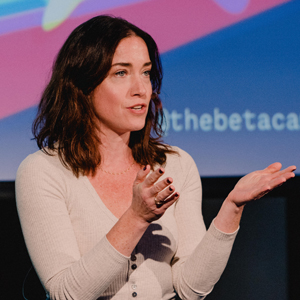11.29.2018
Is this the real life?

Introducing Synthetic Camp: our next early-stage program at Betaworks.
Betaworks Camp is a thematic early-stage program focused on companies building frontier technology. Camp combines Betaworks’ experience in building and investing in consumer internet companies to offer an 11 week in-residence accelerator program in New York City.
Lately we’ve been thinking: maybe the Turing Test isn’t asking the right question. It assumes that we should always know, and care, that machines are machines, and humans are humans. That we need to keep our physical and digital realities distinct. But the last few years have challenged this separation, and the boundaries between the two places have become porous. We have wholly-digital creations entering the real world, like Lil Miquela, who we know is not a real person, yet she seems to exist in real life (thanks to her selfies with actual humans). And we often enter, and spend hours, in digital worlds — Fortnite has become a place to hang out, not merely a game to play. This fluidity and integration of worlds has given rise to a third place — Synthetic Reality — in which the lines blur, or no longer matter, and our human experience is enhanced, augmented, and challenged, by our interactions with intelligent machines. If you communicate regularly with Alexa, you know what I mean.
For Synthetic Camp, there are a number of emergent technologies within Synthetic Reality that interest us:
- deep tech and tools for creating synthetic media
- detection systems for artificially created or modified media
- consumer applications that enable new modes of entertainment or connection
If you are building in one of these areas, we want to hear from you!
One of the most rapidly developing subsets of Synthetic Reality is synthetic media: Algorithmically-generated text, audio, images, and video. In the last year alone there have been significant academic advancements in generative adversarial networks, motion capture, and pose estimation. The quality of synthetic media is improving rapidly and soon will be indistinguishable from that of its human-created counterparts. Image manipulation and CGI aren’t new, but the tools are increasingly sophisticated, while also more available, cost efficient and require less human involvement. Morphin, a Betaworks Ventures portfolio company, allows anyone to insert themselves into pop culture, no photoshop skills required.

Synthetic media has the power to entirely upend the future of the consumer media landscape, with the power to reshape the media we consume and create. Additionally, the introduction of synthetic media into our society has far-reaching implications for the nature of trust, truth, and art — including the first sale at auction of a piece of algorithmically-created art. The frontier technologies that make this possible are of deep interest for Betaworks and we believe that now is the time to invest in them.
Along with advancements in the creation technology, comes increased interest in forgery detection and media authentication, and we are interested in making investments in the products and tools that help engender trust, rather than erode it. We want to learn and share more about the developments of this tech and invest in both teams harnessing this technology for good, and those building products to negate its potential uses for bad.
Synthetic media has the power to entirely upend the future of the consumer media landscape, with the power to reshape the media we consume and create.
In entertainment and social media, we’ve seen a proliferation of digital celebrities, most famously Lil Miquela, promulgated by many fashion brands who have “hired” these artificial creations to front campaigns. It’s easy to imagine a near-future in which modeling agencies employ more developers and designers than scouts and managers. Superplastic, also a portfolio company, creates highly collectible characters (physical world) that also exist and entertain in social media (digital world). While all of these characters are currently created by highly-skilled artists and designers, what’s interesting to us is the opportunity for these digital personas to one day be produced, animated, and distributed by AI.
Popular games, such as Mystic Messenger run in real-time and encourage human players to develop emotionally intimate relationships with the game’s virtual characters. And Betaworks Ventures portfolio company (and Botcamp alum) Hugging Face is a social AI — a chat-based BFF — with which users have exchanged over 400M messages. Now our closest confidants are both human and virtual.

Collectively, we’re calling this mixed-intelligence, hybrid human-machine state Synthetic Reality, and we’re equally interested in the technology powering it, as the emerging consumer behaviors born out of it.
So who and what are we looking for?
We invest in teams at the earliest stage of development — pre-market, and often, pre-product. Additionally, we reserve a few spots for companies further along with development or already in market. Within Synthetic Media, there are many potential layers to this stack: deep tech, distribution and consumer-facing end products–and we’re interested in teams building in all of them. Each layered stack can be then superimposed atop the creation and detection side of this artificially-generated media.
Successful applicants receive $200K investment from Betaworks Ventures, highly relevant programming across technical, user acquisition and fundraising topics, and mentorship from the Betaworks team. Additionally, teams have access to a carefully curated group of industry leaders to assist with both general company-building needs and with topics specific to each Camp theme. We’re looking for founders planning to build big businesses in this new Synthetic Reality.
Applications are open through December 31, 2018, and Synthetic Camp will run February — May 2019. For more information and to apply, visit betaworksventures.com/camp.










